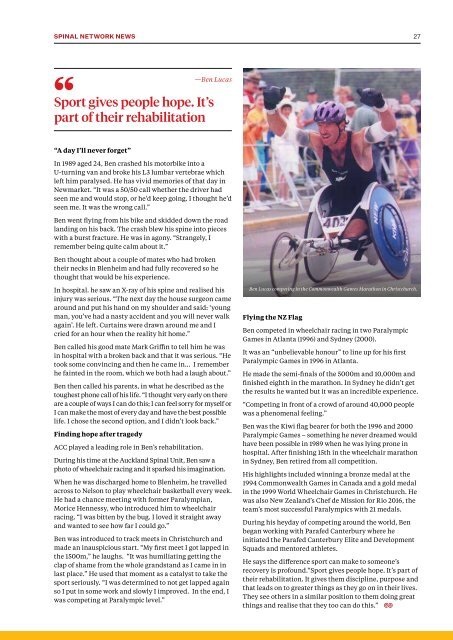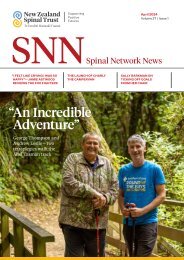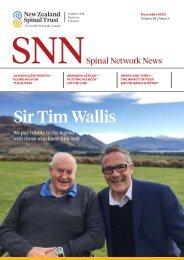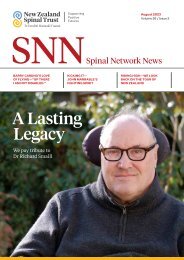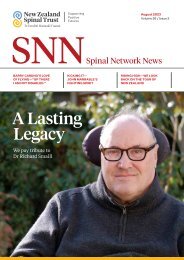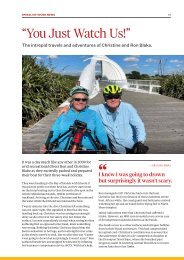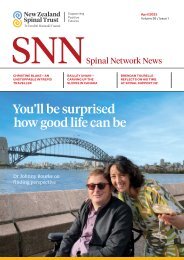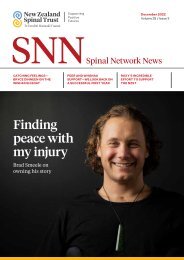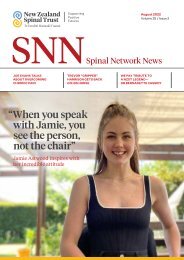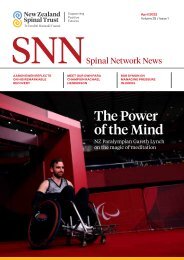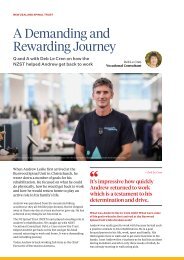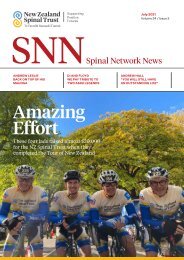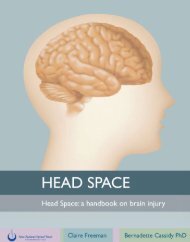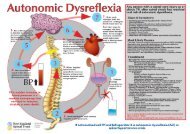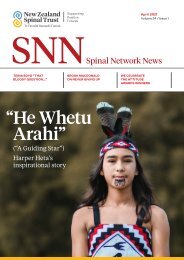You also want an ePaper? Increase the reach of your titles
YUMPU automatically turns print PDFs into web optimized ePapers that Google loves.
SPINAL NETWORK NEWS 27<br />
—Ben Lucas<br />
Sport gives people hope. It’s<br />
part of their rehabilitation<br />
“A day I’ll never forget”<br />
In 1989 aged 24, Ben crashed his motorbike into a<br />
U-turning van and broke his L3 lumbar vertebrae which<br />
left him paralysed. He has vivid memories of that day in<br />
Newmarket. “It was a 50/50 call whether the driver had<br />
seen me and would stop, or he’d keep going. I thought he’d<br />
seen me. It was the wrong call.”<br />
Ben went flying from his bike and skidded down the road<br />
landing on his back. The crash blew his spine into pieces<br />
with a burst fracture. He was in agony. “Strangely, I<br />
remember being quite calm about it.”<br />
Ben thought about a couple of mates who had broken<br />
their necks in Blenheim and had fully recovered so he<br />
thought that would be his experience.<br />
In hospital. he saw an X-ray of his spine and realised his<br />
injury was serious. “The next day the house surgeon came<br />
around and put his hand on my shoulder and said: ‘young<br />
man, you’ve had a nasty accident and you will never walk<br />
again’. He left. Curtains were drawn around me and I<br />
cried for an hour when the reality hit home.”<br />
Ben called his good mate Mark Griffin to tell him he was<br />
in hospital with a broken back and that it was serious. “He<br />
took some convincing and then he came in… I remember<br />
he fainted in the room, which we both had a laugh about.”<br />
Ben then called his parents, in what he described as the<br />
toughest phone call of his life. “I thought very early on there<br />
are a couple of ways I can do this; I can feel sorry for myself or<br />
I can make the most of every day and have the best possible<br />
life. I chose the second option, and I didn’t look back.”<br />
Finding hope after tragedy<br />
ACC played a leading role in Ben’s rehabilitation.<br />
During his time at the Auckland Spinal Unit, Ben saw a<br />
photo of wheelchair racing and it sparked his imagination.<br />
When he was discharged home to Blenheim, he travelled<br />
across to Nelson to play wheelchair basketball every week.<br />
He had a chance meeting with former Paralympian,<br />
Morice Hennessy, who introduced him to wheelchair<br />
racing. “I was bitten by the bug. I loved it straight away<br />
and wanted to see how far I could go.”<br />
Ben was introduced to track meets in Christchurch and<br />
made an inauspicious start. “My first meet I got lapped in<br />
the 1500m,” he laughs. “It was humiliating getting the<br />
clap of shame from the whole grandstand as I came in in<br />
last place.” He used that moment as a catalyst to take the<br />
sport seriously. “I was determined to not get lapped again<br />
so I put in some work and s<strong>low</strong>ly I improved. In the end, I<br />
was competing at Paralympic level.”<br />
Ben Lucas competing in the Commonwealth Games Marathon in Christchurch.<br />
Flying the NZ Flag<br />
Ben competed in wheelchair racing in two Paralympic<br />
Games in Atlanta (1996) and Sydney (2000).<br />
It was an “unbelievable honour” to line up for his first<br />
Paralympic Games in 1996 in Atlanta.<br />
He made the semi-finals of the 5000m and 10,000m and<br />
finished eighth in the marathon. In Sydney he didn’t get<br />
the <strong>res</strong>ults he wanted but it was an incredible experience.<br />
“Competing in front of a crowd of around 40,000 people<br />
was a phenomenal feeling.”<br />
Ben was the Kiwi flag bearer for both the 1996 and 2000<br />
Paralympic Games – something he never dreamed would<br />
have been possible in 1989 when he was lying prone in<br />
hospital. After finishing 15th in the wheelchair marathon<br />
in Sydney, Ben retired from all competition.<br />
His highlights included winning a bronze medal at the<br />
1994 Commonwealth Games in Canada and a gold medal<br />
in the 1999 World Wheelchair Games in Christchurch. He<br />
was also New Zealand’s Chef de Mission for Rio 2016, the<br />
team’s most successful Paralympics with 21 medals.<br />
During his heyday of competing around the world, Ben<br />
began working with Parafed Canterbury where he<br />
initiated the Parafed Canterbury Elite and Development<br />
Squads and mentored athletes.<br />
He says the difference sport can make to someone’s<br />
recovery is profound.“Sport gives people hope. It’s part of<br />
their rehabilitation. It gives them discipline, purpose and<br />
that leads on to greater things as they go on in their lives.<br />
They see others in a similar position to them doing great<br />
things and realise that they too can do this.”


